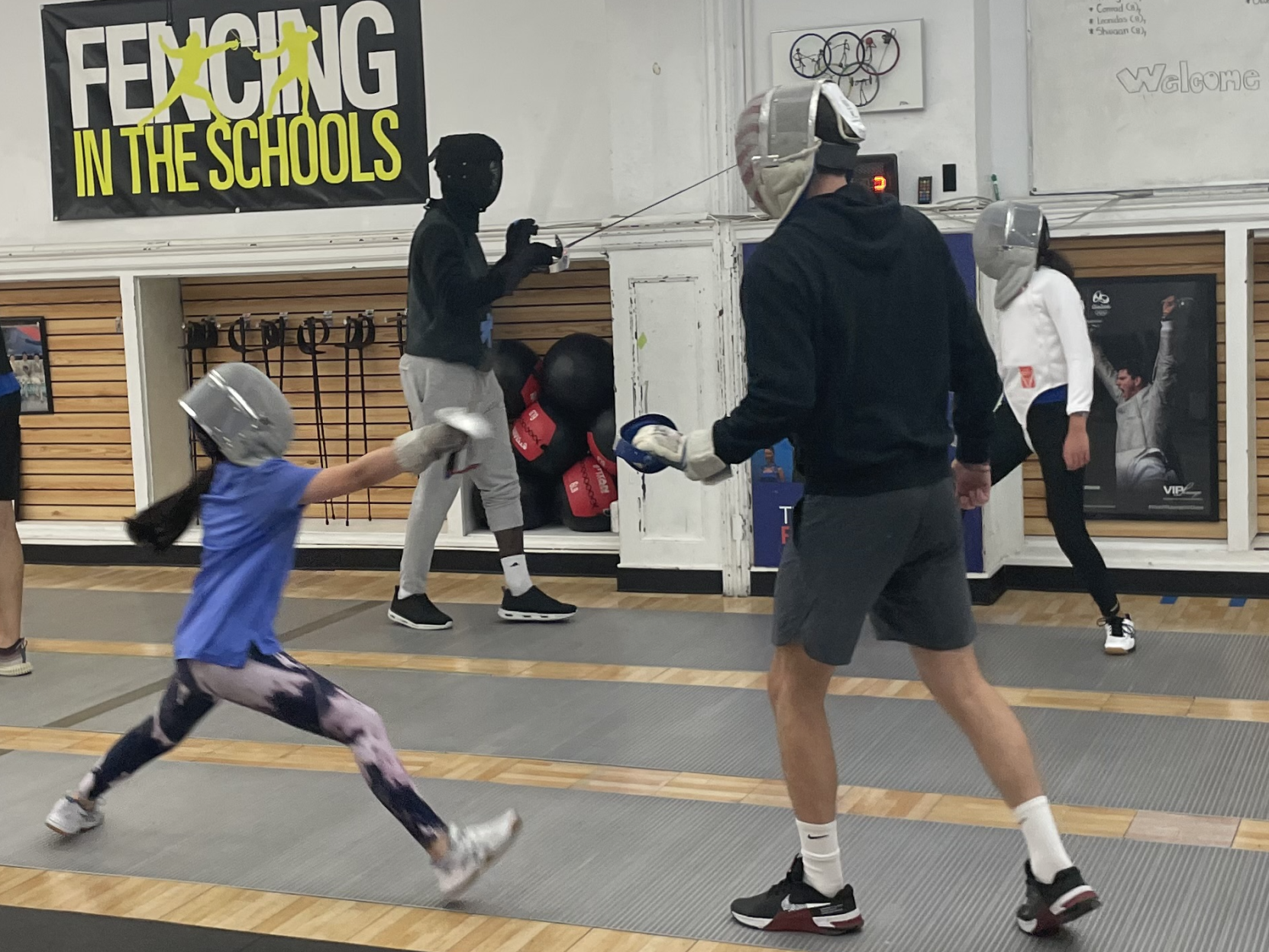
By Scott Etkin
The Young Israel West Side Community Center, a synagogue at West 91st Street between Broadway and Amsterdam Avenue, might not be a place where you’d expect to find Olympians on the Upper West Side. But at the Tim Morehouse Fencing Club, which has been operating out of the synagogue since 2015, elite athletes heading to Paris are not just there, they might even be coaching your kid.
Eli Dershwitz, 28, who will represent the United States this summer in the saber competition, spends four or five days per week coaching young fencers there. On a recent afternoon, the UWS club bustled with children lunging and parrying across a long, narrow room. Dershwitz was in the center of the action, giving a lesson to Sienna Young.
Young, 11, could hardly believe it when she found out she was going to be coached by an Olympian. “I was like, ‘Whoa, that’s kind of crazy,’” she told West Side Rag.
And while the Olympics might seem a world away from learning to fence on the Upper West Side, Dershwitz said he has no trouble relating to his students.
“Everything comes down to [the] basic foundational principles of movements, even if the speed is a little bit slower,” he told the Rag. “Just building good habits, both with the footwork and with the blade work, and making sure that [the] kids are cognizant of how they’re moving, what’s happening to their bodies when they’re accelerating.”
Young, who started fencing when she was eight, has paid close attention. “He’s taught me a lot about how your core is very important. And you need really good footwork,” she said. “And he helps me stay disciplined, but we still have fun.”
Five athletes who coach at Tim Morehouse Fencing Clubs (there are also outlets in Midtown, Westchester, and Stamford, CT) have qualified to compete at the Paris Games. Mohamed Amer and Ziad Elsissy, who will both be in the saber competition representing Egypt, also coach students at the UWS club.

Dershwitz has a longstanding relationship with the founder of the club, Tim Morehouse, a three-time Olympian and silver medalist, who is originally from the Riverdale section of the Bronx. Morehouse helped him navigate life after college as a professional athlete and get into coaching. In fact, their relationship dates back to when Dershwitz was a sophomore in high school in Dover, Mass., and bested Morehouse in a bout, giving him his first “big break” in the sport. That makes helping young athletes – he works with about 20 students consistently – especially rewarding for Dershwitz.
“I’ve seen a lot of these high school kids who are now strong athletes that are successful nationally, but I’ve seen them when they were 12 years old, when they were just getting started,” he said. “Even outside of fencing, to see that development over the years – building strength, building speed, building discipline, building resiliency, emotional and mental. It’s just been really cool to see how […] much of an effect you can have as a coach, to push young athletes to be their best selves.”
Preparing for the Games
Dershwitz is the most senior member of Team USA’s saber fencing contingent (the two other disciplines are epee and foil), having competed at the Rio Games in 2016, while still in college at Harvard, and then in Tokyo in 2021.
After college, Dershwitz continued living in Boston but decided to move to Queens last fall to train with other top fencers. “New York this past year has been where everyone that’s competing or going to the Olympics has been training,” he said. “It just so happened that this is where I needed to be for elite-level training in order to be able to push myself day in and day out.” A typical week includes: two strength sessions; one session focused on mobility and rehab; two to three private lessons with his individual coach; two sessions just training footwork; and four to five fencing practices with more footwork drills and competitive bouting.
When the real competition begins in Paris later this month, Dershwitz will have a cheering section on the UWS. “I’m really excited to see him fence at the Olympics,” said Young. “It’s really fun watching him because he’s a very good fencer, and it’s like someone you could look up to.”
The fencing at the Olympics begins July 27th and runs through August 4th. NBC will broadcast the Games and the most complete coverage will be shown on NBC’s streaming service, Peacock, with some free highlights available on the NBC Olympics website. For those new to fencing, an explainer video on how to understand what you’re watching is – HERE.
Subscribe to West Side Rag’s FREE email newsletter here. And check out the support button below.









Wish them all the best of luck. Go U.S.A.
Fencing is like Chess on Wheels. Besides being an Olympic port by itself in each of its three different weapons; i.e. Foil, Sabre and Epee, it is also one of the events in the Modern Pentathlon. That event includes all of the five things that Napoleonic couriers would have to be masters in in order to serve the emperor in that way; i.e. to carry messages to and from the emperor; Running, Swimming, Shooting, Fencing and Horseback Riding, https://olympics.com/en/paris-2024/sports/modern-pentathlon For youngsters considering college and looking for a scholarship, there a schools that award fencing scholarships and the competition is not as stiff as say swimming or basketball. Interesting. I fenced sabre for Yeshiva College in the 1960s and coached for Vassar, New Paltz State and Duchess County Community College back in the 1970s. When the Empire State Games were held in Syracuse also back in the 1970s I took the Bronze Medal in Sabre in 1979. It was like the Olympics of NY State. I am not sure what it is like these days. Great memories. I encourage youngsters to try it. Also helps if you want to go into the theater as an actor. Fencing is often in plays and all kinds of combat situations will be benefited by knowing how to fence.